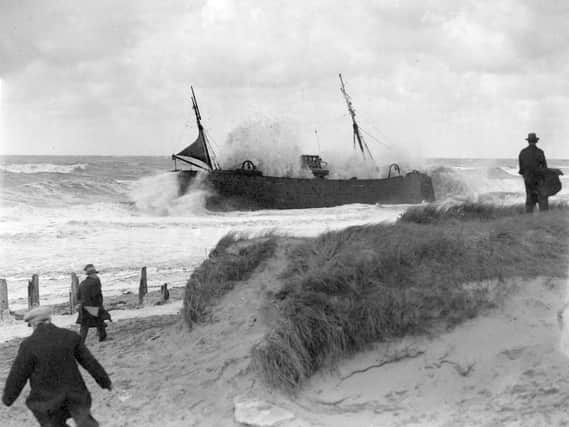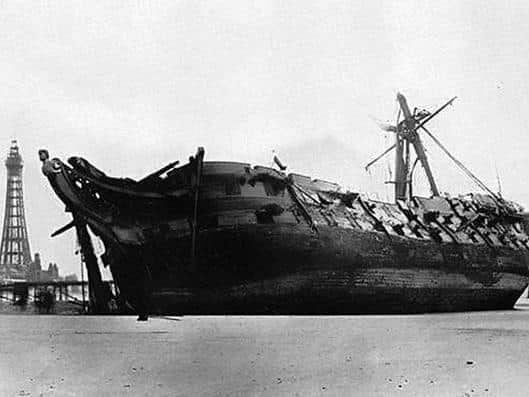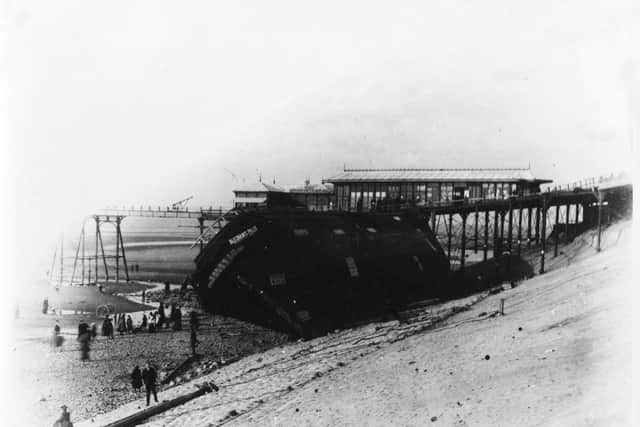How shipwreck turned winter into The Great Pea Souper


It is said that bad luck habitually visits thrice fold.
If it strikes once, be sure it will chime twice over again, a lore that over shadowed Blackpool during the year 1779.
The place was then a rural community comprising 200 cottages built with clay from the cliffs and cobbles from the beach, and isolated from the rest of the world by thick forest.


Or, as some termed it, hideous with woods.
Advertisement
Hide AdAdvertisement
Hide AdThe inhabitants were mainly fishermen and agricultural labourers, supplemented by a tiny number of hotels and inns.
There was no school, no library, not even a church in which they could have prayed for deliverance from the terrible events that were to plague them.
First there was blighted summer which caused fields of potato crop to fail completely.


The prospect of a sustenance absent of “prata” was appalling enough, but then the cornfields yielded such a meagre harvest there was hardly a hattock’s worth that could be reaped. P
Advertisement
Hide AdAdvertisement
Hide Adrices went up and food could only be sourced from ventures inland, the cost of which was beyond the means of many.
With the onset of winter, even fish and cockles would be scarce, and dark months of starvation faced all concerned.
Then came a ferocious storm which robbed cottages of their thatches and flooded many out of their homes.
And that same tempest brought a third potential disaster when a ship was spotted off shore and clearly in trouble.
Advertisement
Hide AdAdvertisement
Hide AdMen gathered on the beach to help, but could only watch helplessly as the vessel was tossed in the angry crests of waves.
Its sails in ribbons, its rudder gone, and each breaker bringing it nearer.
Suddenly a great wave roared into view, lifting the ship high and bringing it crashing down onto the beach.
The crew wasted no time in evacuating the wreck, while the assembled crowd used ropes to help them onto the safety of the sand.
Advertisement
Hide AdAdvertisement
Hide AdAs the last man was rescued the vessel began to break and tear, its splintered parts swallowed back into the snare of the waves.
Then came a ray of salvation for the poor downtrodden locals as the ship’s cargo began to wash up on shore.
Sacks and sacks containing an abundance of… Peas.
The unexpected harvest was quickly reaped and shared out.
For the months that followed, the population of Blackpool lived on the shipwrecked peas and housewives became fanciful with their recipes.
Advertisement
Hide AdAdvertisement
Hide AdSometimes boiled in their own swods (pods), or roasted and sprinkled with alicar (vinegar).
More often the main feature of a stew with whatever else could be scraped together. But usually as a hot, nourishing soup.
In fact, those long months went down in local history as The Great Pea Soup, and it was with great relief when affordable supplies of other produce began to arrive from outside. Other greens, wheat, meat - anything but peas!
Years later, historian Allen Clarke wrote Tales of Old Blackpool and the Fylde (1908) in which he recorded the words of a fisherman who lived through the event.
“Oh, ay, I recollect it weel, we were fair starved of peas.
Advertisement
Hide AdAdvertisement
Hide Ad“We couldn’t stomach ‘em for years after i’ Blackpool. Still th’ peas were a blessing. We should ha’ clemmed but for that wreck, an’ I don’t want to seem ungrateful, but I do know that I did say, after I’d had peas fro’ morn till neet for two months, ‘Well, it were aw nice o’ Providence to send us the pea wreck, but I think it wouldn’t be no wus if he’d just send us a bacon wreck as weel, so that we could have a bit of a change o’ diet.’ ”
n Other notable shipwrecks off Blackpool include the Sirene which was sailing from Fleetwood to Florida in 1892. It was caught up in a hurricane and smashed into North Pier. One of the most famous was HMS Foudroyant in 1897. The ship was used by Nelson as his flagship.
Comment Guidelines
National World encourages reader discussion on our stories. User feedback, insights and back-and-forth exchanges add a rich layer of context to reporting. Please review our Community Guidelines before commenting.